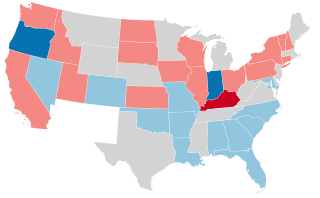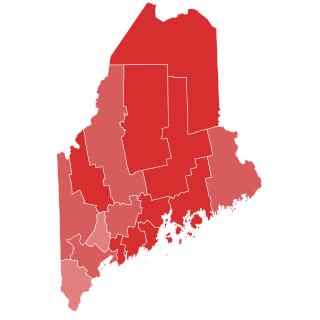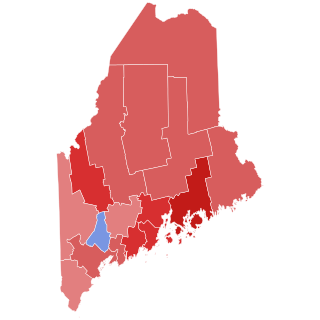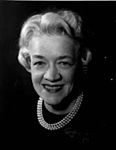
Margaret Madeline Chase Smith was an American politician. A member of the Republican Party, she served as a U.S. representative (1940–1949) and a U.S. senator (1949–1973) from Maine. She was the first woman to serve in both houses of the United States Congress. A Republican, she was among the first to criticize the tactics of Joseph McCarthy in her 1950 speech, "Declaration of Conscience".

The 1972 United States Senate elections were held on November 7, with the 33 seats of Class 2 contested in regular elections. They coincided with the landslide re-election of Republican President Richard Nixon. Despite Nixon's landslide victory, Democrats increased their majority by two seats. The Democrats picked up open seats in Kentucky and South Dakota, and defeated four incumbent senators: Gordon Allott of Colorado, J. Caleb Boggs of Delaware, Jack Miller of Iowa, and Margaret Chase Smith of Maine. The Republicans picked up open seats in New Mexico, North Carolina, and Oklahoma, and defeated one incumbent, William B. Spong Jr. of Virginia.

The 1968 United States Senate elections were elections for the United States Senate. Held on November 5, the 34 seats of Class 3 were contested in regular elections. They coincided with the presidential election of the same year. The Republicans picked up five net seats in the Senate. This saw Republicans win a Senate seat in Florida for the first time since Reconstruction.

The 1966 United States Senate elections were elections on November 8, 1966, for the United States Senate which occurred midway through the second term of President Lyndon B. Johnson. The 33 seats of Class 2 were contested in regular elections. Special elections were also held to fill vacancies. With divisions in the Democratic base over the Vietnam War, and with the traditional mid-term advantage of the party not holding the presidency, the Republicans took three Democratic seats, thereby breaking Democrats' 2/3rds supermajority. Despite Republican gains, the balance remained overwhelmingly in favor of the Democrats, who retained a 64–36 majority. Democrats were further reduced to 63–37, following the death of Robert F. Kennedy in June 1968.

The 1960 United States Senate elections coincided with the election of John F. Kennedy as president on November 8, 1960. The 33 seats of Class 2 were contested in regular elections. A special election was also held on June 28, 1960, for a mid-term vacancy in North Dakota where Democrats flipped a seat to expand their majority to 66–34. As Majority Leader Lyndon Johnson was elected Vice President, Mike Mansfield became the new majority leader.

The 1932 United States Senate elections coincided with Democrat Franklin D. Roosevelt's landslide victory over incumbent Herbert Hoover in the presidential election. The 32 seats of Class 3 were contested in regular elections, and special elections were held to fill vacancies.

The 1908–09 United States Senate elections were held on various dates in various states. As these U.S. Senate elections were prior to the ratification of the Seventeenth Amendment in 1913, senators were primarily chosen by state legislatures. Senators were elected over a wide range of time throughout 1906 and 1907, and a seat may have been filled months late or remained vacant due to legislative deadlock. However, some states had already begun direct elections during this time. Oregon pioneered direct election and experimented with different measures over several years until it succeeded in 1907. Soon after, Nebraska followed suit and laid the foundation for other states to adopt measures reflecting the people's will. By 1912, as many as 29 states elected senators either as nominees of their party's primary or in conjunction with a general election.

The 1986 United States Senate election in Alabama took place on November 4, 1986 alongside other elections to the United States Senate in other states as well as elections to the United States House of Representatives and various state and local elections. Incumbent Republican Senator Jeremiah Denton lost re-election to Democrat Richard Shelby by 6,823 votes.

The 1978 United States Senate election in Maine was held on November 7, 1978. Incumbent Democratic U.S. Senator William Hathaway ran for re-election to a second term, but was defeated by William Cohen, the Republican U.S. Representative from Maine's 2nd congressional district. This is the last time a Senator from Maine lost re-election.

The 1948 United States Senate election in Maine was held on September 13, 1948. Incumbent Republican U.S. Senator and Senate Majority Leader Wallace White did not seek a fourth term in office.

The 1972 United States Senate election in Maine was held on November 7, 1972. Incumbent Republican U.S. Senator Margaret Chase Smith ran for re-election to a fifth term, but was defeated by Democrat William Hathaway. As of 2024, this was the last time the Democrats won the Class 2 Senate seat from Maine.

The 1930 United States Senate election in Maine was held on September 8, 1930. Incumbent Republican U.S. Senator Arthur Gould, who had been elected to complete the term of the late Senator Bert Fernald, did not run for re-election to a full term.

The 1936 United States Senate election in Maine was held on September 14, 1936. Incumbent Republican U.S. Senator Wallace White was re-elected to a second term over Governor Louis J. Brann.

The 1942 United States Senate election in Maine was held on September 14, 1942. Incumbent Republican U.S. Senator Wallace White was re-elected to a third term over Fulton J. Redman.

The 1954 United States Senate election in Maine was held on September 13, 1954. Incumbent Republican U.S. Senator Margaret Chase Smith was re-elected to a second term over Democrat Paul Fullam.

Elmer Hector Violette was an American jurist and Democratic Party politician from Maine. He was a justice of the Maine Supreme Judicial Court from 1981 to 1986 as well as a member of the Maine Superior Court, Maine Senate, and Maine House of Representatives.

The 1918 United States Senate election in Maine was held on September 9, 1918.

The 1924 United States Senate election in Maine was held on September 8, 1924. Incumbent Republican U.S. Senator Bert Fernald overcame a challenge from U.S. Representative Frank E. Guernsey in the Republican primary. In the general election, Fernald was re-elected to a second term in office over Democratic newspaperman Fulton J. Redman.

The 1960 United States Senate election in Maine was held on November 8, 1960. Incumbent Republican U.S. Senator Margaret Chase Smith was re-elected to a third term over Democratic State Senator Lucia Cormier.

The 1966 United States Senate election in Iowa took place on November 8, 1966. Incumbent Republican Senator Jack Miller was re-elected to a second term in office over Democrat E.B. Smith.























